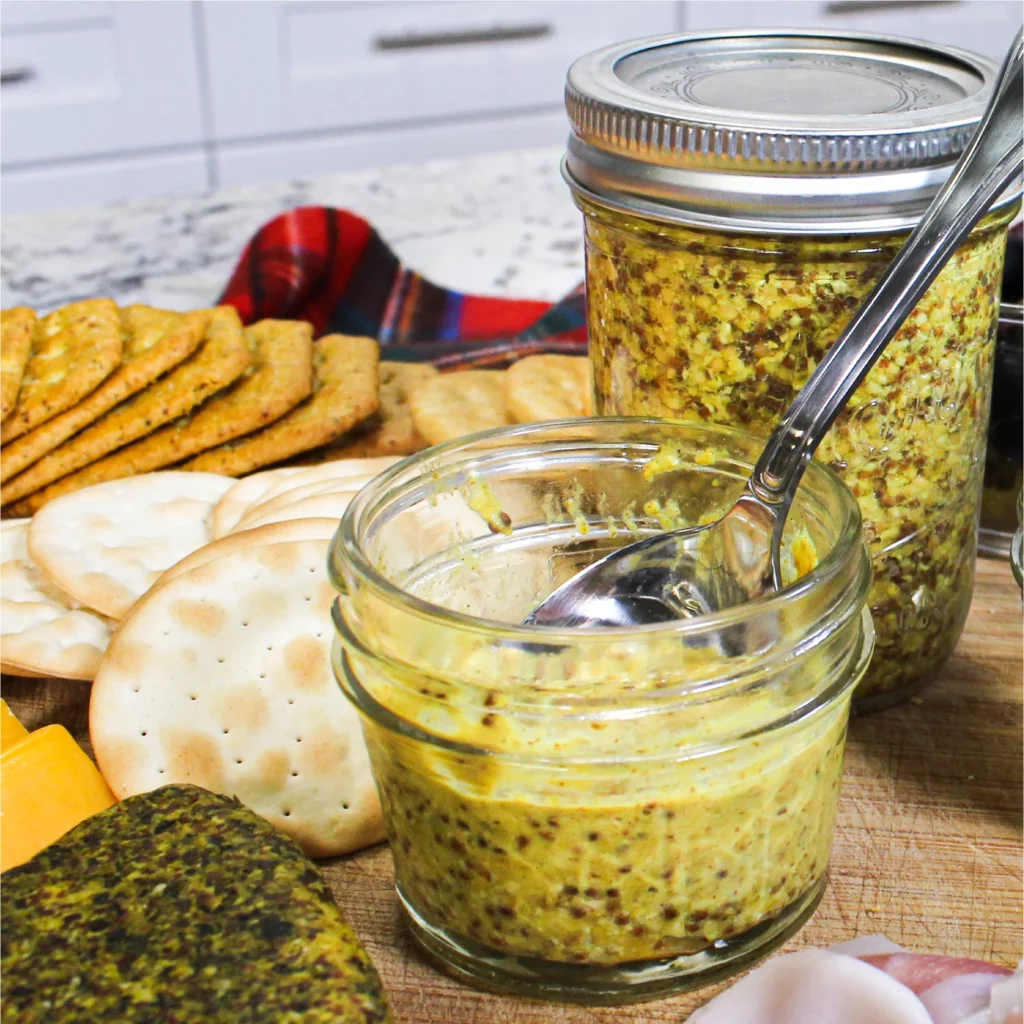About Whole Grain Mustard
There are several vegan alternatives to whole-grain mustard that you can try. So, in this article, you will be able to learn about the vegan alter drives to whole grain mustard. So, join our article until the end of it!
So, now let’s discover the several vegan alternatives to whole grain mustard. They are as follows,
Alternatives
Dijon Mustard
Dijon mustard is made with mustard seeds, white wine, and vinegar, and it has a similar tangy and slightly spicy flavor as whole grain mustard. Just make sure to read the label to ensure it’s vegan.
Spicy Brown Mustard
Spicy brown mustard is made with brown mustard seeds, vinegar, and spices, and it has a bold and slightly spicy flavor. Again, read the label to ensure it’s vegan.
Yellow Mustard
Yellow mustard is made with mustard seeds, vinegar, and turmeric, and it has a milder flavor than whole-grain mustard. It’s a good option if you prefer a less spicy taste.
Horseradish Mustard
Horseradish mustard is made with mustard seeds, vinegar, horseradish, and other spices. It has a bold and tangy flavor, with a hint of heat from the horseradish.
Honey Mustard
Honey mustard is made with mustard seeds, vinegar, and honey. While honey is not considered vegan, several brands offer a vegan version of honey mustard using plant-based sweeteners like agave nectar or maple syrup.
Just like with whole grain mustard, be sure to read the labels and ingredients list to ensure that your mustard is vegan.
When looking for vegan alternatives to whole grain mustard, make sure to check the ingredient labels to ensure that they do not contain any animal-derived ingredients such as honey, milk, or eggs.
So, now let us discuss the uses of these alternatives to whole grain mustard. If we discuss the uses of these, there are several,
Uses
Whole-grain mustard is a condiment made from whole mustard seeds, vinegar, and other flavorings. It has a tangy, slightly spicy taste and a grainy texture. Here are some common uses of whole-grain mustard
Sandwiches
It adds a tangy flavor and texture to sandwiches. It pairs well with deli meats, cheese, and vegetables.
Salad Dressings
It can be used as a base for salad dressings. Mix it with olive oil, vinegar, honey, and herbs for a flavourful dressing.
Marinades
It can be used as a key ingredient in marinades for meats, poultry, and fish. It adds flavor and helps to tenderize the meat.
Glazes
It can be used to make glazes for roasted or grilled meats, vegetables, and tofu. Mix it with honey, soy sauce, or other ingredients for a tasty glaze.
Dips
It can be used as a dip for vegetables, pretzels, and crackers. Mix it with sour cream, Greek yogurt, or cream cheese for a tasty dip.
Sauces
It can be used as a key ingredient in sauces, such as creamy mustard sauce or mustard vinaigrette. It adds a tangy flavor to the sauce.
Toppings
It can be used as a topping for burgers, hot dogs, and sausages. It adds flavor and texture to the dish.
Overall, whole-grain mustard is a versatile condiment that can be used in a variety of dishes to add flavor and texture.
What are the health benefits offered by this valuable vegan alternative to our health? So, let us now discuss the health benefits of it!
Health Benefits

Whole grain mustard is a condiment made from mustard seeds that have not been ground to a fine powder, giving it a coarser texture and a more complex flavor compared to regular mustard. It is often used as a condiment for sandwiches, as an ingredient in salad dressings and marinades, and as a flavoring agent for meats and vegetables.
Here are some potential health benefits of consuming whole-grain mustard.
Rich in Nutrients
It contains a variety of vitamins and minerals such as vitamin C, iron, and magnesium. These nutrients are important for maintaining a healthy immune system, healthy blood cells, and overall energy levels.
May Aid Digestion
Mustard seeds contain compounds that have been shown to stimulate digestion and improve gut health. Additionally, the vinegar used in many mustard recipes can also help with digestion by promoting the production of stomach acid.
May Reduce Inflammation
Mustard seeds contain anti-inflammatory compounds such as omega-3 fatty acids and selenium, which may help reduce inflammation in the body. Inflammation is linked to various chronic diseases, such as arthritis and heart disease.
May Have Anti-cancer Properties
Some studies have found that compounds in mustard seeds may have anti-cancer properties. For example, one study found that a compound in mustard seeds called allyl isothiocyanate inhibited the growth of bladder cancer cells.
Low in Calories
It is a low-calorie condiment, which makes it a good option for people who are watching their calorie intake. It can be used as a flavourful substitute for other high-calorie condiments like mayonnaise or ketchup.
It’s worth noting that while whole-grain mustard may offer some health benefits, it should be consumed in moderation. Mustard is often high in sodium, which can be a concern for people with high blood pressure or other health conditions.
Additionally, some people may be allergic to mustard, so it’s important to exercise caution if you are trying it for the first time.
Nutrition Content
Whole grain mustard is a type of mustard made from coarsely ground mustard seeds mixed with other ingredients such as vinegar, water, salt, and sometimes sweeteners and spices.
The exact nutritional content of whole grain mustard can vary depending on the specific brand and recipe, but here are some general nutrition facts based on a 1 teaspoon (5 gram) serving.
- Calories: 5
- Fat: 0.3 grams
- Sodium: 55 milligrams
- Carbohydrates: 0.5 grams
- Fiber: 0.2 grams
- Protein: 0.2 grams.
It is generally low in calories and contains very small amounts of fat, carbohydrates, and protein. It is also a good source of flavor and can be used as a condiment to add taste to dishes.
However, it is important to note that some whole grain mustards can be high in sodium, so it’s best to check the nutrition label and choose a brand that is lower in sodium if you are trying to limit your sodium intake.
Conclusion
We hope you all discovered all about the vegan alternatives to whole grain mustard. We also hope to let you know the valuable recipes that can be made with these alternatives. So, stay tuned to our articles and blog site to know about these factors and knowledge.
You can also share these important facts with these alternatives among your friends and the ones who are interested in corn growing. We also hope to bring you many articles about these alternatives and their nutrients, and health benefits which are provided to them very soon. As always, we remind you to stay tuned to our blog site and keep in touch with our regular articles until next time!

